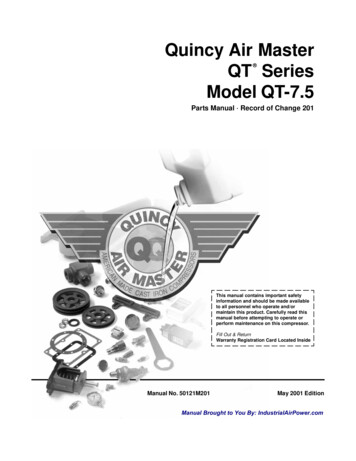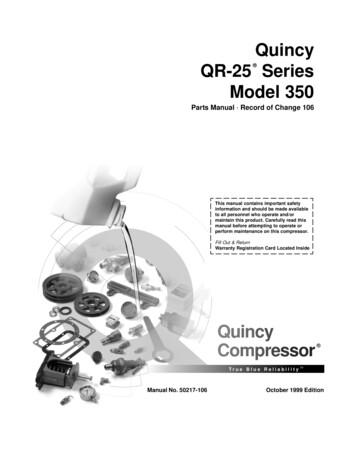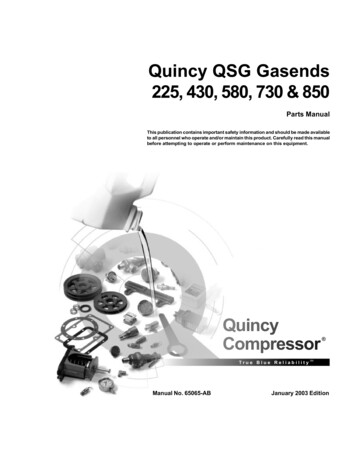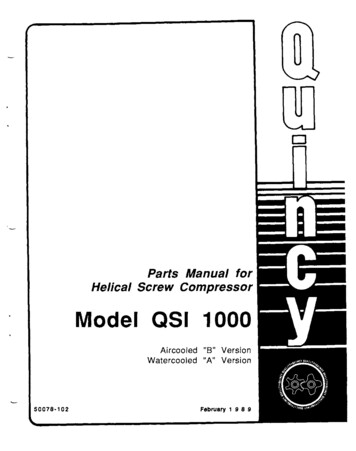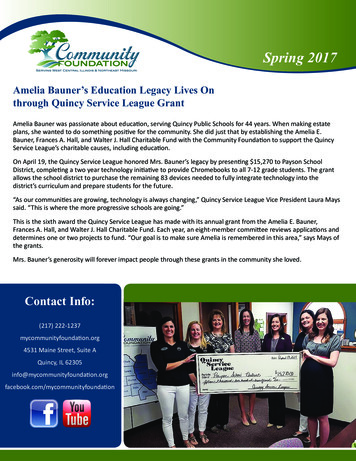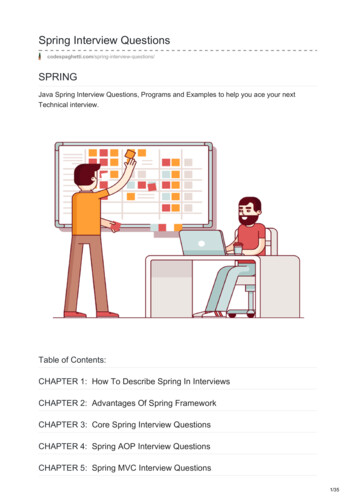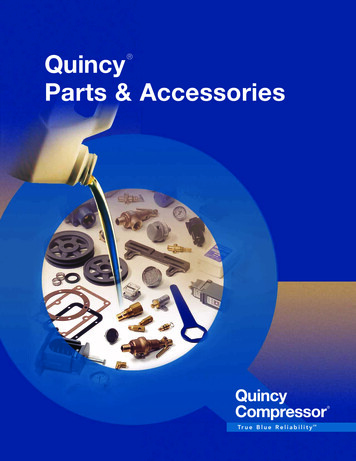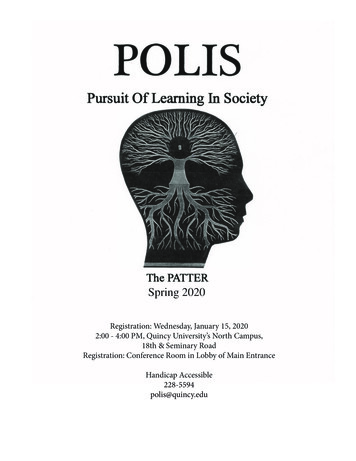
Transcription
Spring 2020Registration: Wednesday, January 15, 20202:00 - 4:00 PM, Quincy University’s North Campus,18th & Seminary RoadRegistration: Conference Room in Lobby of Main EntranceHandicap Accessible228-5594polis@quincy.edu
Dear POLIS Member,Spring POLIS Schedule 2020Welcome back to another semester at Quincy University.We hope your holidays were filled with joy and peace andthat 2020 began well. We hope for winter and spring to bekind to us and our region.JAN 29 - The Presidential Difference: Leadership StyleWe have again designed a set of offerings which promises to interest and intrigue. We will be welcoming five newpresenters: Susan Asher, Dr. Dinita Cooley, Dr. SiobhanDoucette, Dr. Dave Lockhart, and Dr. Meenal Mamdani.You will note that many of our presenters are familiar toyou. Mike Flanagan is returning to talk about his work onThe Mississippi River and other rivers, preparatory to thespring bus tour. Plans are underway for a trip to the Missouri History Museum in St. Louis and lunch at a restauranton The Hill. The special exhibit at the museum is “TheMighty Mississippi.” Larry Ruemmler will be supplying youwith more details about the trip.FEB 5 - A SPECStacular way for PUPILS to REAL EYES:current diagnosis and treatment options forcommon eye conditions.Most of our courses, except some on Fridays, will be heldin the North Cafeteria, a space we share with QU’s RetreatCenter. Some of our Friday courses will be held in A 323,the tiered classroom named in memory of Frank Strieby.POLIS board members continue to serve in various ways:registering members, over seeing our finances, promotingPOLIS in our community, selecting courses and presenters, producing the POLIS PATTER, acting as facilitators,offering hospitality, pitching in whenever needed. We arealso welcoming a new board member: Mary Ann Freeman.Special thanks to Sue Archambo for searching out a delightful selection of cookies and keeping our pantry full.from FDR to Barack ObamaJAN 31 - Polygamy in AmericaFEB 12 - Andrew Wyeth and Family: A Proud FamilyTradition of American Art.FEB 18 - Adventures of a Citizen-Scientist withEarthwatch Institute.FEB 21 - Elvis Presley: The Making of a Music IconFEB 27 - 1960: A RetrospectiveFEB 28 & MAR 6- Prometheus at Mont Blanc: A Study ofPercy Bysshe ShelleyMAR 3 - 21st Century GeneticsMAR 19 & 26 - The Peculiar Institution Part II:The Fall of American SlaveryMAR 20 - Constitutionalization of CriminalProcedure/Incorporation DoctrineMAR 25 - Roles of Women During the American Civil WarWe are appreciative of the work of our new office assistant,Kathy Baker. We are also grateful to QU’s Pasha Yates,Miriam Hermann, and Matt Bergman from QU’s Alumniand Advancement Office who maintain our mailing list,manage our site on the QU web page, and this semesterarrange for the publication and mailing of The PATTER.We are also grateful for the support of QU’s IT staff andthe Security Office.MAR 27 & APR 3 - Murder or Suicide? The collapse ofdemocracy in the German Weimar Republic andthe rise of Adolf HitlerWe are very encouraged by the increase in new members.You are our best recruiters. We urge you to invite thoseyou know to join POLIS. A reminder: we welcome as yourguests those who have never attended a course. They mayattend one course for free and sample POLIS. Please notethat if they wish to attend more courses, they are expectedto become members of POLIS. We will add them to ourmailing list as well.APR 7 & 14 - Caste in India: From origins to the presentPlease save the date for our Annual Meeting and Social onMay 1st. Looking forward to seeing you in the new year!MAY 1 - POLIS Annual Meeting and End of the Year PartyDr. Mary Ann Klein, Emerita Professor of EnglishPresident, DirectorPOLIS (Pursuit of Learning in Society)MAR 31 - Conversations regarding Advanced Directivesin the ElderlyAPR 1 & 8 - Life on the Mississippi—and a few othersAPR 15 - Missouri History Museum and Favazza’sRestaurant “On the Hill” in St. LouisAPR 21 & 28 - Ukraine and the Struggle for FreedomAPR 23 - A Few Good Women (but first, a few bad ones)
Board of DirectorsMary Ann Klein, PresidentBarb Richmiller, Vice-PresidentSunny Straub, SecretaryJane Blickhan, TreasurerSue ArchamboPaula BristolMary Ann FreemanMeenal MamdaniLarry RuemmlerDan TannaOffice Assistant: Kathy BakerPOLIS Office: 122DQuincy University POLIS ScholarshipPOLIS sustains an endowed scholarship forQuincy University students and has contributed 57,045 to date. Personal donations andmemorials to the scholarship are welcome.HERE IS WHAT YOU NEED TO KNOW: POLIS is an opportunity for lifelong learning for seniors, 55 years. There are two semesters each year requiring amembership fee of 15 per semester. Choose from 15 or more classes each semester.Classes are 4 each. Classes are casual in lecture format with no tests,plus cookies and coffee at break. Cancellations do occur due to inclement weather.Call the office at 217-228-5594 to hear cancellationmessages.Coming Attraction:Thursday, September 17, 2020Visit the new Kirkwood theater,Stages St. Louis, for an enjoyablematinee production of “AlwaysPatsy Cline”. Two professionalactresses portray Patsy Cline and afan she met on tour. The showfeatures drama, comedy, and 23 ofPatsy Cline’s memorable songs!Inclusive price: ticket plus lunch: 100 formembers; 115 for non-membersPOLIS will need commitmentsand payments at the Fall 2020Registration. Larry Ruemmlerwill provide more information.POLIS Where is it?Classes are from 2:00-4:00 pm at QuincyUniversity’s North Campus, 18th & SeminaryRoad. Most classes are in the North Cafeteriawhich is on the lower level and Strieby 323Aon the third floor. Locations do change. Lookfor the POLIS signs and follow the arrowspointing the way.ParkingParking Lot L is a small lot, but close to theclassroom in the North Cafeteria. Enter LotL from Seminary Road. Additional handicapparking is in the front circle drive. Generalparking is available on the north side lot.North Campus is HANDICAP ACCESSIBLE Attend a one time only class for free to see if POLISis for you. Walk in. Sit down and enjoy. Information: Call 217-228-5594, email: polis@quincy.edu, online- www.quincy.edu/academic/polisWE LOOK FORWARD TO SEEINGYOU THIS SEMESTER
January 29The Presidential Difference: Leadership Stylefrom FDR to Barack ObamaWednesday (one day) Fee: 4A non-partisan, multi-media overview of the workof Fred Greenstein who surveys each president’spolitical skill, vision, cognitive style, organizationalcapacity, ability to communicate, and emotionalintelligence—and argues that the last is the mostimportant in predicting presidential success.Greenstein offers a series of bottom-linejudgments on each of his thirteen subjects aswell as an overarching theory of why presidentssucceed or fail.February 5A SPECStacular way for PUPILS to REALEYES current diagnosis and treatmentoptions for common eye conditions.Wednesday (one day) Fee: 4Topics will include cutting-edge diagnosis andtreatment of Diabetic Retinopathy,Glaucoma,Macular Degeneration, and Cataracts/CataractSurgery.Lecturer: Dr. John C. Schafer, Ph. D. CPA:Professor of Business at Hannibal-La GrangeUniversity from 1987 until retirement in 2016.Lecturer: Dr. Dinita Cooley, O.D.Graduated from Quincy University in 2007.Doctor of Optometry from University ofMissouri—St. Louis. Participated in residencyprogram at the Kansas City VA MedicalCenter, focusing on Ocular Disease and LowVision Rehabilitation. Currently working atSPECS in Quincy.January 31Polygamy in AmericaFriday (one day) Fee: 4February 12Andrew Wyeth and Family: A Proud FamilyTradition of American Art.Wednesday (one day) Fee: 4This course is about polygamy in the UnitedStates as practiced by the FundamentalistMormons (FLDS) and other Fundamentalistsplinter groups. It will examine the legal,social, and financial implications of these religiousgroups and how the Federal Government hashistorically intervened to address these practices.It will examine the history of the FLDS,the rise topower of Warren Jeffs, and his subsequent trialand incarceration.Lecturer: Judith Abbott, J. D.Assistant Professor of Criminal Justice, QuincyUniversity“An exploration of the American tradition ofwatercolor and illustrative painting by theWyeth Family: N. C., Andrew and Jamie.An extraordinary family of talent, artistic geniusand a strongly traditional and contemplativelybeautiful art.”Lecturer: Carol NicholsTaught Fine Arts and Humanities at John WoodCommunity College and Culver-Stockton College.Certified Iyengar Yoga instructor; advancedcalligrapher and water color artist.
February 18Adventures of a Citizen-Scientist with Earthwatch Institute.Tuesday (one day) Fee: 4The course will present the mission and historyof the Earthwatch Institute. Earthwatch volunteers (citizen-scientists) participate in the fieldon one of the following areas of study: wildlifeand ecosystems; ocean health; climate change;archaeology and culture. The field studies, calledexpeditions, are worldwide and are a week ortwo weeks long. The instructor will discuss howthe field studies/expeditions are set up, researchobjectives of the studies, life in the field, and anyresults or finds.The instructor has been on five archaeologicalstudies (England, Peru,Thailand, Italy, andPortugal), two animal studies (South Africa andAustralia) and two ecosystem/climate changestudies (Easter Island and India).Lecturer: Susan Asher: retired Air Force Lt.Colonel; spent 23 year career in satelliteoperations and engineering. Originally fromPhiladelphia, PA. She owned Thyme-out TeaParties from 2002-2019. A member of the MuddyRiver Herb Guild and one of its past presidents.February 21Elvis Presley: The Making of a Music IconFriday (one day) Fee: 4Who was the man that became The King of Rockand Roll? This course will take a look at ElvisPresley’s life, career, and music.Lecturer: Dr. Christine Damm, DMA; AssistantProfessor of Music, Quincy UniversityDr. Damm serves as the Director of the QUHawk Express Jazz Band. She is the principalclarinetist with the Quincy Symphony Orchestraand maintains a private woodwind studio.February 271960: A RetrospectiveThursday (one day) Fee: 4The United States in 1960 was a nation on thebrink of transformation. This session will coverthe key events that took place in the first yearof what would be the most turbulent decade inAmerica since the Civil War. The U2 Crisis, theKennedy-Nixon debates, and other historicalepisodes will be discussed and analyzed in orderto show how they shaped the rest of the 1960s.Lecturer: Dr. Justin P. Coffey, Ph. D. Professorof History, Quincy UniversityDr. Coffey specializes in American political historyand is the author of Spiro Agnew and the Rise ofthe Republican Right. He is currently working ona biography of Richard M. Nixon.February 28 and March 6Prometheus at Mont Blanc: A Study of PercyBysshe ShelleyFriday (two days) Fee: 8In this two-session course, we will examine theradicalism of Percy Bysshe Shelley, whosesubversive poetry scandalized readers on bothsides of the Atlantic. By studying his verse anddrama, we will also explore what Shelley’s workhas to tell us 200 years after the publication ofPrometheus Unbound.Lecturer: Dr. Michael Keller, Ph. D. AssistantProfessor of English, Quincy University2020 is the 30th Anniversaryof the Founding of POLIS
March 321st Century GeneticsTuesday (one day) Fee: 4This course will introduce students to DNA editingtechniques that will change the face of geneticresearch and the world of medicine. Topics willinclude an overview of cell biology, DNA, thestructure of a gene, the genetic basis of disease,and how CRISPR is used to manipulate DNAgenetic research and its potential applicationsin medicine. The ethical implications of alteringgenomes will be introduced.Lecturer: Dr. Lee Enger, Ph. D. AssociateProfessor of Biochemistry, Quincy UniversityAssistant Vice President of Academic Affairs andDirector of Academic AdvisingMarch 19 and 26The Peculiar Institution Part II: The Fall ofAmerican SlaveryThursday (two days) Fee: 8This two-part course asks students toexamine the end of race-based slavery in theUnited States, one of the most importantdevelopments of the 19th century. By examiningthe role of the abolitionist movement, theimportance of runaway slaves, the contribution ofAbraham Lincoln, and the critical actions of whiteand black soldiers, we will complicate and clarifyone of the quintessential American questions:Who Freed the Slaves?Lecturer: Dr. Scott E. Giltner, Ph. D.,Professor of History and Chair of the Division ofApplied Liberal Arts and Sciences, CulverStockton College. By training an environmentalhistorian interested in the intersection of race,and subsistence, particularly in postemancipation societies. Author of Hunting andFishing in the New South: Black Labor and WhiteLeisure After the Civil War. Member andpresident of Association of Academic Programsin Latin America and the Caribbean. Currentlyworking on a new book on race relations inNortheast Missouri during and afterReconstruction.March 20Constitutionalization of Criminal Procedure/Incorporation DoctrineFriday (one day) Fee: 4This course will provide the following: generalbackground of the operations of criminalprocedures in a federal republic; discussion of theBill of Rights application before the 14th Amendment; applicability of the Bill of Rights to statesafter the passage of the 14th Amendment; theDue Process Clause and incorporation (absorption) under the Due Process Clause and the various theories used to apply the provision of the Billof Rights to the states. Discussion of significantcases in this area.Lecturer: Jim Palmer, J. D. A practicing attorneywho handles, among other matters, ConstitutionalLaw issues, governmental affairs, Civil Libertieslitigation (primarily as defense counsel). Adjunctfaculty member at Quincy University, teachingamong other courses, Constitutional Law, CivilRights, and Civil LibertiesPOLIS honors the memory ofDr. Merle CrosslandBoard Member and Past PresidentRIP October 2019
March 25Roles of Women During the American CivilWarWednesday (one day) Fee: 4March 31Conversations regarding Advanced Directivesin the ElderlyTuesday (one day) : Fee 4This course will discuss women whose namesmany are familiar with such as nurse ClaraBarton, novelist Harriet Beecher Stowe, spyBelle Boyd, and Underground Railroad conductorHarriet Tubman, It will also discuss women lessfamiliar but equally interesting such as Dr. MaryWalker, the first woman to receive the Medalof Honor; “Crazy Betty” van Lew, a spy for theNorth; Galesburg’s Mary Ann Bickerdyke;Quincy’s Louisa Mertz; Jenny Hodgers. The veryprominent, Julia Dent Grant, wife of U. S. Grantwill also be highlighted. This course will alsodiscuss societal changes that resulted from thewar and the ways in which these have affectedAmerican women into the 21st century.Everyone wants to die at peace, yet people arenot dying the way they would want. 75% of thosepolled state that they would prefer to die at home,surrounded by loved ones, yet statistics show that72% of deaths occur in hospitals. This sessionwill explore some of the solutions to that,including Advanced Directives (Living Wills),Health Care POAs, and the Conversation Project.Lecturer: Beth Young, retired educator whotaught forty-seven years at Quincy Senior HighSchool, John Wood Community College, andQuincy University. Involved in the Civil WarRound TableMarch 27 and April 3Murder or Suicide? The collapse ofdemocracy in the German Weimar Republicand the rise of Adolf HitlerFriday (two days) Fee: 8This course will offer some insights into the issueof the current global stress on democracy byexploring what happened in Germany after WorldWar I and how the rise of Nazism and Hitleraffected or influenced it.Lecturer: Dr. Wendell Mauter, Ph. D. , EmeritusProfessor of History, Quincy UniversityLecturer: Dr. David Lockhart, M.D.: Retiredfrom a 40-year career as a family physician inQuincy, IL, including 30 years as a certifiedGeriatrician and 22 years as medical directorof the Blessing Hospice. He will share hisperspectives on Geriatiric Care, especially atthe end of life.April 1 and 8Life on the Mississippi—and a few othersWednesday (two days); Fee 8Nearly fifty years ago, I began working on theMississippi River. I got a job as a deckhand on aRiver Towboat, pushing barges up and down therivers. Though I’ve been retired now for fifteenyears, I still remember some of the things that Ilearned during the thirty-five years that I pursuedthat occupation. During these few hours, we willsurvey the rivers of the world. We will think aboutwhat purposes rivers serve, both to make thisearth inhabitable and as features of civilization.(Think how rivers have often served ascharacters in the history of the world.)Then we will pick on the Mississippi River Basinand all the rivers that feed it as it flows towardthe Gulf of Mexico. We will find history here, too.Early on, when white skinned people first invadedNorth America, the Mississippi River Basinbecame their first “interstate” avenue of transitand commerce. We will find time to survey thecurrent technology which enables the mostefficient means of transporting huge tonnages ofcargos that has yet been devised.Lastly, we will try to get a feel for the way that
life is lived by those persons who make a livingtending to the needs (quoting John Hartford) ofthose “Towboats pushin’ them barges, on a longhot summer day.”Lecturer: Mike FlanaganBegan working on the River in 1970. Promotedto captain in 1975, Worked for several differentRiver Towing Companies. Retired from the Riverin 2006.B. S. in Transportation, Culver-Stockton College,1983B. A. in Philosophy and Religion, Culver-StocktonCollege, 1993April 7 and 14Caste in India: From origins to the presentTuesday (two days): Fee: 8Caste is unique to Hindus in India. It is firstmentioned in the Rig Veda around 1500 BC.Caste is a hierarchical system that dictates socialcustoms such as marriage, adoption, occupation,education, etc. It is a self-limiting group such thatone can only be born into it. While casterestrictions were more rigid in the past, even theless restrictive version that continues to thepresent day exerts enormous influence onpolitics, education, social mobility and marriage.Other religions too in India like Christianity orIslam have adopted caste distinctions. Casterestrictions exist even among Indians who haveimmigrated to USA and to a lesser extent insecond generation Americans of Indian origin.The course will describe the different castesystems and their customs, what DNA evidencesuggests about the origin of this system, theefforts to reform the worst aspects and how itcontinues to exert a major role in modern India.Lecturer: Dr. Meenal Mamdani, M. D.is a neurologist who migrated to USA in 1972along with her husband, Bashir Mamdani, anephrologist. After practicing in the Chicago areafor 30 years, they retired to Quincy to be neartheir son and his family. Meenal spends wintersin Mumbai where she has extended family andfriends.April 15“Mighty Mississippi” Exhibit at MissouriHistory Museum and Favazza’s Restaurant“On the Hill” in St. LouisWednesday (one day) Fee: 60 per person formembers, 75 per person for a non-memberEnjoy a spring adventure via a guided tour of the“Mighty Mississippi,” a new exhibit at the MissouriHistory Museum. There will also be time for youto visit the permanent exhibits and gift shop. Startwith lunch at Favazza’s patio savoring some ofthe finest Italian food in St. Louis. All inclusivecost is 60 for members; 75 for non-members.We will depart from the north parking lot of QU’sNorth Campus at 9 a. m. andreturn at 6:30 p.m.Organizer: Larry RuemmlerApril 21 and 28Ukraine and the Struggle for FreedomTuesday (two days) Fee: 8This course will provide a glimpse into the historyof a country which has been much in the newsof late but which is often overlooked in Europeanhistory survey courses. Historically, Ukraine’sfertile lands have attracted diverse peoples;Viking warriors, Christian missionaries, Cossackfighters, Jewish traders and Polish farmers haveall called Ukraine home. The modern history ofUkraine has been overshadowed by foreigndomination. In 1991, with the overthrow of theSoviet Union, Ukrainian independence wasachieved and yet this independence has beentarnished by corruption, foreign interference, andwar. Join us for this two-part course, as weepisodically discuss Ukraine’s rich history.Siobhan Doucette is Assistant Professor ofHistory at Quincy University. She earned herPhD in History from Georgetown University. Herresearch and publications focus on East CentralEurope and Civil Resistance. She is the authorof Books are Weapons: The Polish OppositionPress and the Overthrow of Communism.
April 23A Few Good Women(but first, a few bad ones)Thursday (one day) 4This course will highlight the careers of threeinfamous women who perpetrated corporatefraud, followed by a discussion of the careersof three famous whistle blowers. The infamousinclude Peggy Curtin of St. John’s ChildrenHospital, Springfield, IL; Rita Crudwell of Dixon,IL; Elizabeth Holmes of Theranos. The famouswhistle blowers include Alayne Fleischmann ofJP Morgan Chase, Sharron Watkins of Enron,and Cynthia Cooper of World Com.Lecturer: Vicky Eidson, Associate Professor ofAccounting, Quincy University. Teaching at QUsince 2005. She is also a registered CertifiedPublic Accountant and a Certified ManagementAccountant.May 1POLIS Annual Meeting and End of the YearPartyFriday, No FeePlease join us for refreshments as we celebrateanother year. The annual meeting and end of theyear party will be in the North Campus Cafeteriaand begins at 2:00 p.m.
Registration for POLIS Spring classes Wednesday, January 15, 2020.Name:Phone:Address:Mobile Phone:City:Zip:Emergency Contact:Email:Preferred Method of contact:Phone Email TextRegistration: January 15, 2:00-4:00 PM, in the Conference Room at the entrance (across from snack bar) of QU’s NorthCampus or by mail: POLIS, Quincy University, 1800 College Ave., Quincy, IL 62301. Information: Call 217-228-5594 orEmail: polis@quincy.eduCourseDateMembership fee to PolisSpring Semester 15The Presidential Difference: Leadership Style from FDR toBarack ObamaPolygamy in AmericaJanuary 29Schafer 4January 31Abbott 4A SPECStacular way for PUPILS to REAL EYES currentdiagnosis and treatment options for common eye conditionsAndrew Wyeth and Family: A Proud Family Tradition ofAmerican ArtAdventures of a Citizen-Scientist with Earthwatch InstituteFebruary 5Cooley 4February 12Nichols 4February 18Asher 4Elvis Presley: The Making of a Music IconFebruary 21Damm 41960: A RetrospectiveFebruary 27Coffey 4Prometheus at Mont Blanc: A Study of Percy Bysshe ShelleyFebruary28-March 6March 3Keller 8Enger 4March 19 &26March 20Giltner 8Palmer 4Roles of Women During the American Civil WarMach 25Young 4Murder or Suicide? The collapse of democracy in theGerman Weimar Republic and the rise of Adolf HitlerMarch 27 &April 3Mauter 8Conversations regarding Advanced Directives in the ElderlyMarch 31Lockhart 4Life on the Mississippi—and a few othersApril 1 & 8Flanagan 8Caste in India: From origins to the presentApril 7 & 14Mamdani 8Missouri History Museum and Favazza’s Restaurant “On theHill” in St. LouisUkraine and the Struggle for FreedomApril 15RuemmlerApril 21 & 28Doucette 60 75 8A Few Good Women (but first, a few bad ones)April 23Eidson 4POLIS Annual Meeting and End of the Year PartyMay 121st Century GeneticsThe Peculiar Institution Part II: The Fall of American SlaveryConstitutionalization of Criminal ll
POLIS 2020 Spring Course 42128Wednesday1815POLIS reg.2229 SchaferThursday29162330Friday310172431 hursdayFriday291623310172441118 Asher255 Cooley12 Nichols19266132027 Coffey71421 Damm28 KellerMonday29162330Tuesday3 Enger10172431 LockhartWednesday4111825 YoungThursday51219 Giltner26 GiltnerFriday6 Keller1320 Palmer27 sday2916Friday3 Mauter1017Saturday4111819262027Wednesday1 Flanagan7 Mamdani 8 Flanagan14 Mamdani 15 Bus tourRuemmler21 Doucette 2228 Doucette 2923 Eidson302425MondayTuesdayThursdayFriday1 31017244111825512192661320277142128
Graduated from Quincy University in 2007. Doctor of Optometry from University of Missouri—St. Louis. Participated in residency program at the Kansas City VA Medical Center, focusing on Ocular Disease and Low Vision Rehabilitation. Currently working at SPECS in Quincy. February 12 Andrew Wyeth and Family: A Proud Family Tradition of American Art.



